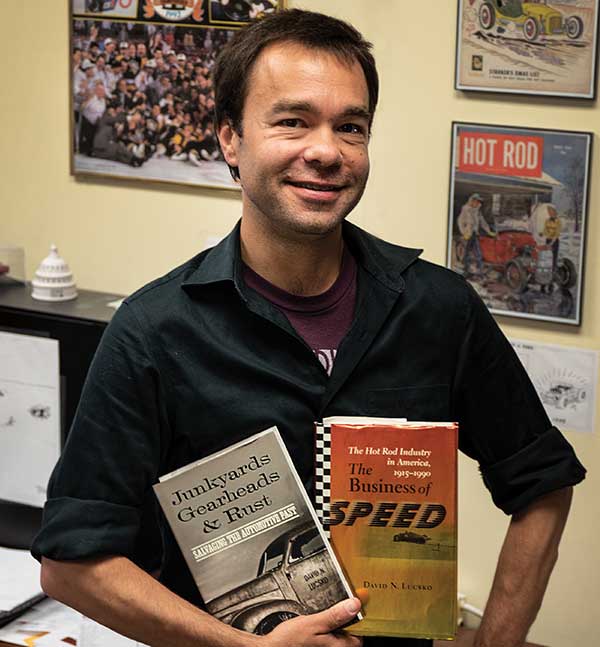Childhood love for classic cars leads to academic pursuit and research passion
Article body
Dr. David Lucsko is known at Auburn University as the chair of the Department of History in the College of Liberal Arts. It is the position he recently rose to since joining its faculty in 2010.
Lucsko is also known for his love of classic cars, particularly the restoration of those would-be forgotten machines of the automotive industry’s bygone era—and as the author of two insightful and historically thorough books that explore the growth of the hot rod car sub-culture as a significant segment of automotive Americana.
“As a child, I was always fascinated with cars,” Lucsko said. “I liked machines of all types, buildings, too, but my passion was cars, particularly classic cars and relics.”
Lucsko spent countless hours playing with toy cars as a young boy and was always sketching cars on the back of his school notebooks. He found himself so absorbed in his passion that by high school Lucsko had decided that he would attend nearby Georgia Tech and become an industrial engineer.
“I just knew that I wanted to be an engineer, so that I could design those cars and machines that I loved so much,” he said.
But a decision during his high school senior year changed his thinking and his career path forever.
“I wanted to take a course that offered college credit that I could take with me to Georgia Tech,” he said. “That course happened to be one in European History.”
What happened next surprised him: “I loved that class,” he said.
“I still wanted to be an engineer, but I really loved history,” Lucsko said. “I went on to enroll at Georgia Tech, and I still planned to become an engineer and to design cars. But almost as soon as I got there, I learned about a program Tech offered called History, Technology and Society. I went to that office to talk and learn more, and after speaking with the faculty, a light went off in my head—this is what I want to do.”
He enrolled and the rest is… history. “I spent only one day as an engineering major,” Lucsko quipped.
In that program, Lucsko was able to fuse his passions for automobiles, machines and industrial technology with his love of history.
Lucsko completed his degree at Georgia Tech and decided to pursue graduate school. He attended the Massachusetts Institute of Technology (MIT), where he studied under Dr. Merritt Roe Smith, a widely respected expert in 19th century manufacturing.
Before he enrolled, Lucsko took a year off, reacquainted himself with some of his car-tinkering pals from high school and began to rekindle his love of restoring old Volkswagens. It was during that summer he got the idea to explore the link between auto restoration and hot rodding for a paper proposal.
Lucsko presented it to Smith, half expecting it to be rejected.
To my surprise, he approved,” Lucsko said. “Dr. Smith excitedly interjected that he, too, had long been a fan of hot rod trucks, and he enthusiastically blessed my proposal.”
Thus began Lucsko’s path to his destiny.
“My paper morphed into my doctoral dissertation, and my dissertation grew into my first book, “The Business of Speed: The Hot Rod Industry in America, 1915-1990.”
Lucsko added that as he conducted the research for that book, he began to hear another story which led to his second book, “Junkyards, Gearheads and Rust: Salvaging the Automotive Past.”
“The more I researched, the more I learned that automobile restoration, hot rodding and the culture of those individuals who enjoy the hands-on hobby/profession of doing this work have a history dating all the way back to the Ford Model T, and they represent a significant segment of that industry in America and in the rest of the world,” Lucsko said.
Lucsko is in the early stages of research on a third book project, which will focus specifically on the automotive restoration hobby.
Auburn University is a nationally ranked land grant institution recognized for its commitment to world-class scholarship, interdisciplinary research with an elite, top-tier Carnegie R1 classification and an undergraduate education experience second to none. Auburn is home to more than 30,000 students, and its faculty and research partners collaborate to develop and deliver meaningful scholarship, science and technology-based advancements that meet pressing regional, national and global needs. Auburn's commitment to active student engagement, professional success and public/private partnership drives a growing reputation for outreach and extension that delivers broad economic, health and societal impact. Auburn's mission to educate, discover and collaborate drives its expanding impact on the world.


